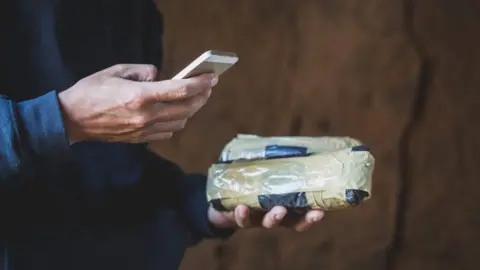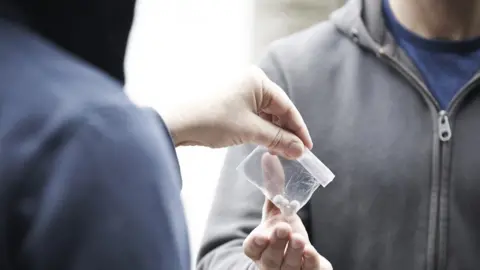Nearly 1,500 arrests in county lines drug dealing crackdown
 Getty Images
Getty ImagesNearly 1,500 people have been arrested in England and Wales in a week-long operation against so-called county lines drug dealing networks.
Police say they have started focusing on senior figures controlling phone numbers used to sell drugs.
Officers are also using modern slavery and human trafficking laws to prosecute gangs exploiting vulnerable children.
Some 139 county lines were closed, and almost £2m of Class A drugs, including cocaine and heroin, seized.
County line gangs are urban drug dealers who sell to customers in more rural areas via dedicated phone lines.
They have become central to the trade in illegal substances across Britain and the way they operate is often accompanied by serious violence.
Gangs in cities operate phone lines advertised in other towns and rural areas to supply drugs, while remaining at arm's length to reduce the risk of arrest.
But police changed tactics two years ago and now have a strategy of identifying the "line holder" by analysing phone records, meaning gang leaders can often be arrested in possession of the phone, proving their involvement.
As a result the number of arrests has been growing during regular week-long operations in which different police forces co-ordinate their efforts.
A total of 85% of defendants are now pleading guilty and the conviction rate is 99%, said Graham McNulty, deputy assistant commissioner of the National Police Chiefs Council (NPCC).
"We are making significant inroads into dismantling violent county lines.
"The figures speak for themselves. We're stopping abhorrent criminals abusing young people and lining their own pockets in the process," he said.
An assessment of county lines drug dealing produced by the NPCC suggests the number of active lines has fallen from around 2,000 in 2018 to 600.
In the latest police push, between 11 October and 17 October:
- 1,468 people were arrested
- 2,664 vulnerable people, including 2,209 children, were identified - with work beginning to protect their safety
- 6kg of crack cocaine, 28.8kg of heroin and 26.8kg of cocaine were seized, along with £1,254,384 in cash
- 289 weapons were seized, including 49 guns and 120 knives
Police also visited 894 addresses used by drug gangs for their operations against the will of the resident, a practice known as "cuckooing".
Most of the gangs operate from Merseyside, the West Midlands and London.
County lines gangs groom children and vulnerable adults to get them moving drugs around the country, often using threatening and coercive behaviour.
 Getty Images
Getty ImagesPolice are pioneering the use of "victimless prosecutions" which aims to reduce the need for victims to give evidence in court.
However, the Children's Society, a charity that works with young people facing abuse, neglect and exploitation, wants the government to boost the law on the criminal exploitation of children by adding a definition of the offence to the new Policing Bill.
Iryna Pona, Policy Manager at The Children's Society, said: "This should also provide clarity for professionals in identifying young victims and would be strengthened further by a national strategy, supported by funding, to ensure more children get earlier help, ending the current postcode lottery in support."
"There needs to be a relentless focus among professionals upon identifying and supporting children at risk of exploitation as early as possible."
The Children's Society runs a campaign, Look Closer, designed to help people spot signs that children and vulnerable adults are involved with county lines.
James Simmonds-Read, from The Children's Society's prevention programme which has worked alongside police said: "It's vital that professionals spot instances where children have been exploited by criminals, so we are pleased that many vulnerable people - including young people - have been identified as being in need of support."
"The public can also play a crucial role in spotting signs of exploitation and reporting them to the police and Look Closer highlights how everyone from commuters to transport and shop staff can help children to escape horrific exploitation."
"Young people may not ask for help themselves because they have been manipulated into thinking they are making a choice or because they have been subjected to terrifying threats."
The British Transport Police try to stop drugs being transported on trains.
Meanwhile, the National Crime Agency is focusing on stopping drugs getting into the country in the first place.
Recently the NCA has charged six men with importing 2.3 tonnes of cocaine worth £190m.
Other seizures include 5.2 tonnes of cocaine being transported by sea, and the discovery of heroin and cocaine inside a British lorry.
NCA Director of Investigations Nikki Holland said: "It is a high priority for the NCA to build on the successes we have had in source countries and along the drugs supply routes, so that organised crime groups land fewer drugs in our towns and cities and prevent them being pushed further afield through county lines groups."
